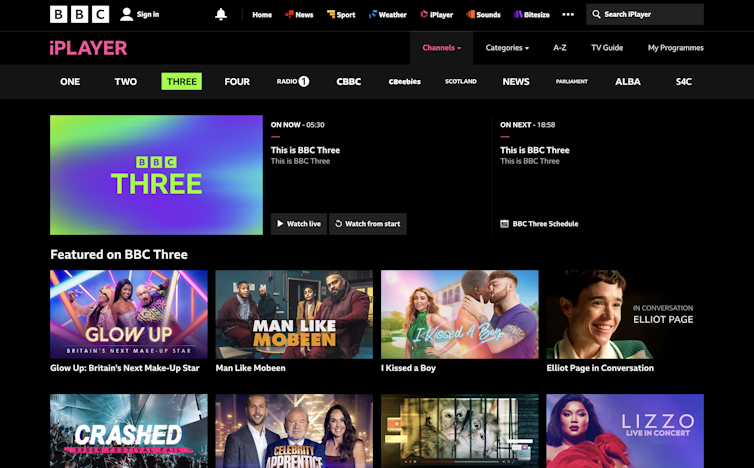With the vast array of options of what to watch online, have you ever wondered why you picked that new comedy or that old documentary? Would you have chosen to watch them if they were on terrestrial TV? How much were you nudged to choose them by subtle prompts from the online streaming platforms?
Last year, when a new British streaming TV platform, ITVX, launched, it promised to be “led” by viewers who could “choose [from] thousands of hours of content”. Disney+ has made a similar promise: “Watch the way you want.”
Many video-on-demand platforms have positioned themselves as driven by audiences. And there is no doubt that the amount of televisual and other content has increased and that consumers do now have more control. But just how much do online users actively choose what they consume?
I wanted to investigate this question, so my colleagues and I conducted a study analysing some of the specific predictors of TV programmes’ success, both on streaming platforms and on linear TV. We found several ways that streaming services can make their content more likely to be watched.
How much are we really in control?
We are not alone in starting to ask questions about how much agency video-on-demand users actually have. The media academic Mike van Esler’s study showed that streaming platforms like Netflix impose numerous technical and visual limitations on users.
For example, Netflix hides functions like the search bar or genre homepages in a sidebar and prioritises certain programmes, often those owned by the platform.
Such limitations certainly could limit user agency, but to see whether that’s actually the case we need to study not just interfaces but audiences. This is starting to happen. In a Norwegian study, audience members talked about how video-on-demand platforms steered their viewing behaviour, including by recommending programmes as “top picks” or “you may also like”.
With our study, we’ve tried to extend such emerging evidence by looking at the actual behaviour of millions of viewers.
As we’re interested in the influence that streaming platforms have on what viewers watch, two of the key programme characteristics that we looked at were whether and for how long a programme was promoted on key pages on the streaming platform and how long the programme was available to stream on the platform.
And, because we’re interested in the deliberate viewing choices that users make, we also looked at programme genre.
We did this not only for programmes consumed on a streaming TV platform, but also, as a comparison, for programmes broadcast by the same channel on linear television.
Specific genres
There’s evidence that audiences have preferences for specific TV genres and that those preferences affect viewing behaviour. For example, one study found that viewers were more likely to view a programme if it was of the same genre as the show they had been watching immediately beforehand.
There are, of course, other programme characteristics that may affect the viewing they attract, like awards they received, so we took as many of these characteristics as we could into account.
The channel we analysed was BBC Three and we got our viewing data from the UK’s official television audience measurement service, Barb.
The most challenging part of the data collection was finding out whether, and how, programmes had been promoted on the channel’s online interfaces. We focused on three places of promotion – BBC’s Three’s homepage, the home page of the BBC’s streaming platform, iPlayer, and the BBC Three landing page on iPlayer.

BBC
Our results show that the strongest predictor of a programme’s viewing was the number of days the programme was available on the channel’s video-on-demand platform. By contrast, the number of times a BBC Three programme was transmitted on linear TV was not a significant positive predictor of viewing.
Being able to control how long programmes are available to stream appears to give video-on-demand platforms significant power over what audiences watch. The longer fruit is dangled in front of a viewer, the likelier they are to grab it.
The rule of thumbnails
Our results suggest that video-on-demand platforms may have power over what audiences watch via how they position a programme’s thumbnail image on key pages. We found a positive correlation between on-demand viewing of BBC Three programmes and whether and how their thumbnails were placed and prioritised on the homepage of BBC Three’s website and BBC Three’s landing page on iPlayer.
Our analysis also shows that, on average, comedy programmes attracted significantly more viewing. The same effect was not found, however, with other genres, like entertainment. These results mirror the results for linear TV, where just one or two genres predicted the amount of viewing programmes received.
The fact that genre appears to be no more important as a predictor of viewing on BBC Three’s streaming platform than on its linear platform may surprise some. After all, video-on-demand platforms’ talk often about user choice, which includes, presumably, viewers’ preferences for particular genres of programme.
Predictors of viewing
So what does this mean? Taken together, our findings on availability, thumbnail image placement and genre lend weight to the questions being raised about the supposed “total” control that users have on video-on-demand platforms. It isn’t quite as total as you might expect.
Our study does, of course, have limitations. We didn’t account for all possible predictors of programme viewing. Additional predictors could include advertising, peer-to-peer recommendations and press coverage. In addition, we were working with aggregate, rather than individual-level data, and so couldn’t account for the possible effects of viewers’ socio-demographics.
Nevertheless, our study does suggest that, in spite of dramatic changes in the ways in which television programmes are distributed and consumed, television channels can still assert considerable control over what their viewers choose to watch.![]()
Neil Thurman, Senior Honorary Research Fellow, Department of Journalism, City, University of London
This article is republished from The Conversation under a Creative Commons license. Read the original article.














